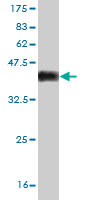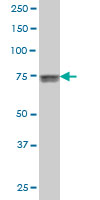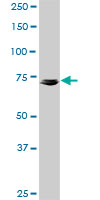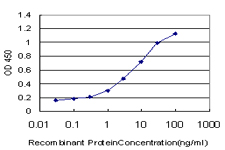KCNQ4 Antibody (monoclonal) (M01)
Mouse monoclonal antibody raised against a partial recombinant KCNQ4.
- 产品详情
- 实验流程
- 背景知识
Application
| WB, E |
|---|---|
| Primary Accession | P56696 |
| Other Accession | NM_004700 |
| Reactivity | Human, Mouse |
| Host | mouse |
| Clonality | monoclonal |
| Isotype | IgG3 Kappa |
| Clone Names | 2H6 |
| Calculated MW | 77101 Da |
| Gene ID | 9132 |
|---|---|
| Other Names | Potassium voltage-gated channel subfamily KQT member 4, KQT-like 4, Potassium channel subunit alpha KvLQT4, Voltage-gated potassium channel subunit Kv74, KCNQ4 |
| Target/Specificity | KCNQ4 (NP_004691, 596 a.a. ~ 695 a.a) partial recombinant protein with GST tag. MW of the GST tag alone is 26 KDa. |
| Dilution | WB~~1:500~1000 E~~N/A |
| Format | Clear, colorless solution in phosphate buffered saline, pH 7.2 . |
| Storage | Store at -20°C or lower. Aliquot to avoid repeated freezing and thawing. |
| Precautions | KCNQ4 Antibody (monoclonal) (M01) is for research use only and not for use in diagnostic or therapeutic procedures. |
For Research Use Only. Not For Use In Diagnostic Procedures.
Provided below are standard protocols that you may find useful for product applications.
BACKGROUND
The protein encoded by this gene forms a potassium channel that is thought to play a critical role in the regulation of neuronal excitability, particularly in sensory cells of the cochlea. The current generated by this channel is inhibited by M1 muscarinic acetylcholine receptors and activated by retigabine, a novel anti-convulsant drug. The encoded protein can form a homomultimeric potassium channel or possibly a heteromultimeric channel in association with the protein encoded by the KCNQ3 gene. Defects in this gene are a cause of nonsyndromic sensorineural deafness type 2 (DFNA2), an autosomal dominant form of progressive hearing loss. Two transcript variants encoding different isoforms have been found for this gene.
REFERENCES
DFNA2 Nonsyndromic Hearing Loss Smith RJH, et al. , 1993. PMID 20301388.Replication of previous genome-wide association studies of bone mineral density in premenopausal American women. Ichikawa S, et al. J Bone Miner Res, 2010 Aug. PMID 20200978.Analysis of gene polymorphisms associated with K ion circulation in the inner ear of patients susceptible and resistant to noise-induced hearing loss. Pawelczyk M, et al. Ann Hum Genet, 2009 Jul. PMID 19523148.Audioprofile-directed screening identifies novel mutations in KCNQ4 causing hearing loss at the DFNA2 locus. Hildebrand MS, et al. Genet Med, 2008 Nov. PMID 18941426.KCNQ4 mutations associated with nonsyndromic progressive sensorineural hearing loss. Nie L. Curr Opin Otolaryngol Head Neck Surg, 2008 Oct. PMID 18797286.
终于等到您。ABCEPTA(百远生物)抗体产品。
点击下方“我要评价 ”按钮提交您的反馈信息,您的反馈和评价是我们最宝贵的财富之一,
我们将在1-3个工作日内处理您的反馈信息。
如有疑问,联系:0512-88856768 tech-china@abcepta.com.























 癌症的基本特征包括细胞增殖、血管生成、迁移、凋亡逃避机制和细胞永生等。找到癌症发生过程中这些通路的关键标记物和对应的抗体用于检测至关重要。
癌症的基本特征包括细胞增殖、血管生成、迁移、凋亡逃避机制和细胞永生等。找到癌症发生过程中这些通路的关键标记物和对应的抗体用于检测至关重要。 为您推荐一个泛素化位点预测神器——泛素化分析工具,可以为您的蛋白的泛素化位点作出预测和评分。
为您推荐一个泛素化位点预测神器——泛素化分析工具,可以为您的蛋白的泛素化位点作出预测和评分。 细胞自噬受体图形绘图工具为你的蛋白的细胞受体结合位点作出预测和评分,识别结合到自噬通路中的蛋白是非常重要的,便于让我们理解自噬在正常生理、病理过程中的作用,如发育、细胞分化、神经退化性疾病、压力条件下、感染和癌症。
细胞自噬受体图形绘图工具为你的蛋白的细胞受体结合位点作出预测和评分,识别结合到自噬通路中的蛋白是非常重要的,便于让我们理解自噬在正常生理、病理过程中的作用,如发育、细胞分化、神经退化性疾病、压力条件下、感染和癌症。









